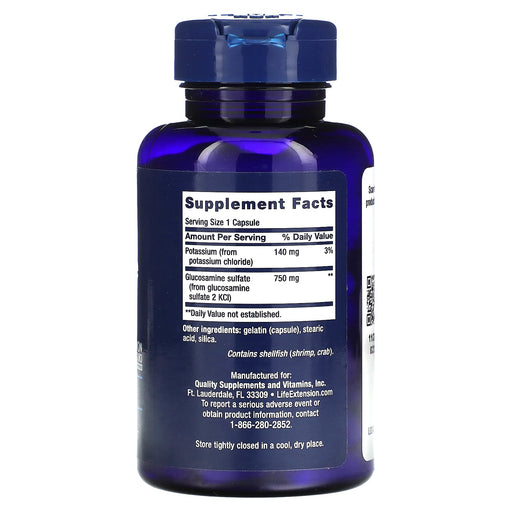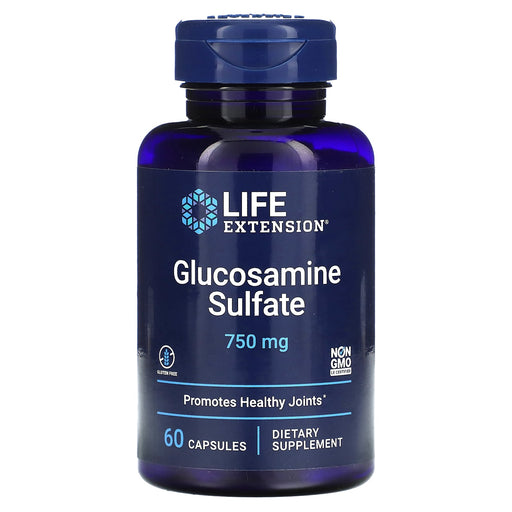
Supporting Joint Health and Mobility with Glucosamine Supplements
Glucosamine is a naturally occurring compound found in the body that plays a crucial role in the formation and maintenance of healthy cartilage, the connective tissue that cushions and lubricates joints. As we age, our body's natural production of glucosamine declines, which can lead to joint discomfort, stiffness, and reduced mobility. Glucosamine supplements have gained popularity as a natural way to support joint health, reduce inflammation, and promote overall joint function and comfort.
What is Glucosamine?
Glucosamine is an amino sugar that serves as a building block for the synthesis of glycosaminoglycans (GAGs), the main structural components of cartilage, tendons, and ligaments. GAGs, such as hyaluronic acid and chondroitin sulfate, help maintain the elasticity, strength, and shock-absorbing properties of joint tissues.
There are two main forms of glucosamine used in supplements:
- Glucosamine Sulfate: This form of glucosamine is derived from the shells of crustaceans, such as shrimp, crab, and lobster, and is the most well-studied form for joint health benefits.
- Glucosamine Hydrochloride: This form of glucosamine is also derived from crustacean shells but does not contain sulfur. While it may be less effective than glucosamine sulfate, it is often used in supplements for individuals with shellfish allergies.
Glucosamine supplements are often combined with other joint-supportive nutrients, such as chondroitin sulfate, MSM (methylsulfonylmethane), and collagen, for a more comprehensive approach to joint health.
Benefits of Glucosamine Supplementation
Incorporating glucosamine supplements into your wellness routine may offer several potential benefits for joint health and overall well-being, including:
- Joint Comfort and Mobility: Glucosamine has been shown to help reduce joint discomfort, stiffness, and inflammation, promoting improved joint function and mobility. By providing the building blocks for healthy cartilage, glucosamine supplements may help slow the progression of joint degeneration and support overall joint health. Combining glucosamine with other joint-supportive nutrients like chondroitin, MSM, and omega-3 fatty acids can provide a synergistic effect for optimal joint comfort and flexibility.
- Cartilage Synthesis and Repair: Glucosamine plays a vital role in the production of GAGs, which are essential for maintaining the integrity and resilience of cartilage. By supporting the synthesis of these key structural components, glucosamine supplements may help promote cartilage repair and slow the breakdown of joint tissues. Pairing glucosamine with collagen and vitamin C, which are crucial for collagen synthesis, can further support cartilage health and regeneration.
- Inflammation Management: Some studies suggest that glucosamine may help modulate inflammation in the joints by inhibiting the production of pro-inflammatory compounds, such as nitric oxide and prostaglandin E2. By reducing inflammation, glucosamine supplements may help alleviate joint discomfort and promote overall joint health. Combining glucosamine with anti-inflammatory nutrients like curcumin, boswellia, and omega-3s can provide a comprehensive approach to managing joint inflammation.
- Bone Health Support: Glucosamine has been shown to help stimulate the production of osteoblasts, the cells responsible for building and maintaining strong bones. By supporting bone health and density, glucosamine supplements may help reduce the risk of osteoporosis and fractures, particularly in postmenopausal women. Pairing glucosamine with other bone-supportive nutrients like vitamin D, calcium, and vitamin K2 can provide a holistic approach to skeletal health.
- Gut Health and Immune Support: Recent research suggests that glucosamine may help support gut health and immune function by promoting the growth of beneficial gut bacteria and modulating the immune response in the digestive tract. Combining glucosamine with probiotics, prebiotics, and other gut-supportive nutrients like L-glutamine and zinc carnosine can further enhance its potential benefits for digestive health and immunity.
Choosing the Best Glucosamine Supplement
When selecting a glucosamine supplement, consider the following factors to ensure you are getting a high-quality, effective product:
- Form of Glucosamine: Look for supplements that contain glucosamine sulfate, as this form has the most scientific evidence supporting its efficacy for joint health benefits. If you have a shellfish allergy, consider glucosamine hydrochloride as an alternative.
- Dosage and Serving Size: Follow the recommended dosage instructions on the product label, typically ranging from 1,500-2,000 mg of glucosamine per day, divided into two to three doses. Start with a lower dose and gradually increase as needed, or consult with a healthcare professional for personalized guidance.
- Complementary Ingredients: Consider glucosamine supplements that include other joint-supportive nutrients, such as chondroitin sulfate, MSM, collagen, or omega-3 fatty acids, for a more comprehensive approach to joint health.
- Quality and Purity: Choose glucosamine supplements from reputable brands that adhere to strict quality control standards, such as third-party testing for purity and potency, and are manufactured in GMP-certified facilities.
- Brand Reputation: Select glucosamine supplements from trusted brands with a history of producing high-quality, science-backed products and a commitment to transparency and safety.
Tips for Incorporating Glucosamine Supplements into Your Wellness Routine
To maximize the potential benefits of glucosamine supplementation and support overall joint health, consider the following tips:
- Be Patient and Consistent: The effects of glucosamine supplementation may take several weeks to become noticeable, so be patient and take your supplement consistently as directed for optimal results.
- Combine with a Balanced Diet: While glucosamine supplements can provide valuable support for joint health, they should be used in conjunction with a balanced, nutrient-rich diet that includes plenty of anti-inflammatory foods, such as fatty fish, leafy greens, and colorful fruits and vegetables.
- Stay Active: Engage in regular low-impact exercise, such as swimming, cycling, or yoga, to help maintain joint flexibility, strength, and overall mobility. Consult with a physical therapist or healthcare professional for personalized guidance on joint-friendly activities.
- Maintain a Healthy Weight: Excess body weight can put additional stress on your joints, leading to increased wear and tear. Maintaining a healthy weight through a balanced diet and regular exercise can help reduce the burden on your joints and promote overall joint health.
- Consider Complementary Therapies: Incorporate other joint-supportive therapies, such as acupuncture, massage, or heat and cold therapy, to help alleviate joint discomfort and stiffness and promote overall joint health and well-being.
Experience the Difference in Your Joint Health with Premium Glucosamine Supplements from Health Orchard
Take control of your joint health and mobility with Health Orchard's curated selection of high-quality glucosamine supplements. Our collection features pure, potent glucosamine sulfate and hydrochloride options, as well as comprehensive joint health formulas that include synergistic nutrients like chondroitin, MSM, collagen, and omega-3 fatty acids for optimal results.
Witness the potential of this essential building block for healthy cartilage and experience the benefits of improved joint comfort, flexibility, and overall function. With a focus on quality, efficacy, and your individual needs, Health Orchard is your trusted source for the best glucosamine supplements on the market. Invest in your joint health and overall well-being with premium glucosamine supplements from Health Orchard. Explore our collection today and take a proactive step towards supporting your joints, reducing inflammation, and maintaining optimal mobility for an active, vibrant life.
Frequently Asked Questions about Glucosamine
1. What are the benefits of taking glucosamine?
Glucosamine is a natural compound found in cartilage, and taking glucosamine supplements may offer several benefits, including:
- Reducing joint pain and stiffness associated with osteoarthritis
- Slowing the progression of joint damage in osteoarthritis
- Improving joint mobility and function
- Supporting the production of synovial fluid, which lubricates and cushions joints
- Promoting the synthesis of cartilage components, such as collagen and proteoglycans
Glucosamine supplements are often used to manage symptoms of osteoarthritis and support overall joint health.
2. Is glucosamine safe for the kidneys?
Glucosamine is generally considered safe for most people when taken at recommended doses. However, there is some concern that glucosamine may affect kidney function, particularly in people with pre-existing kidney problems. Glucosamine is metabolized by the kidneys, and high doses may increase the workload on these organs. If you have a history of kidney disease or are at risk for kidney problems, it's essential to consult with a healthcare professional before taking glucosamine supplements. They can help you weigh the potential benefits and risks based on your individual health status.
3. Is glucosamine safe to take every day?
Glucosamine is generally considered safe for daily use when taken at recommended doses. Many studies have evaluated the long-term safety of glucosamine, with some lasting up to three years, and found no significant adverse effects. However, it's essential to follow the dosage instructions provided by the manufacturer or your healthcare professional and not exceed the recommended daily intake. If you experience any unusual symptoms or side effects while taking glucosamine, discontinue use and consult with a healthcare provider. As with any supplement, it's always best to discuss its use with a qualified healthcare professional before starting a daily regimen.
4. Who should avoid glucosamine?
While glucosamine is generally considered safe for most people, some individuals should avoid or use caution when taking glucosamine supplements. These include:
- People with shellfish allergies, as some glucosamine supplements are derived from shellfish
- Individuals with diabetes, as glucosamine may affect blood sugar levels
- People taking blood-thinning medications, such as warfarin, as glucosamine may increase the risk of bleeding
- Pregnant or nursing women, as the safety of glucosamine during pregnancy and lactation is not well-established
- Those scheduled for surgery, as glucosamine may interfere with blood sugar control and increase the risk of bleeding
It's essential to consult with a healthcare professional before taking glucosamine, especially if you have pre-existing health conditions or are taking medications.
5. Is glucosamine toxic for liver?
Glucosamine is not typically considered toxic to the liver when taken at recommended doses. In fact, some studies suggest that glucosamine may have potential liver-protective properties. However, there have been rare reports of liver enzyme elevations in people taking glucosamine supplements, although a direct causal relationship has not been established. If you have a history of liver disease or are concerned about your liver health, it's essential to consult with a healthcare professional before taking glucosamine. They can monitor your liver function and help you make an informed decision based on your individual health status.
6. What are the negative effects of glucosamine?
While glucosamine is generally well-tolerated, some people may experience negative effects when taking glucosamine supplements. These may include:
- Digestive discomfort, such as nausea, diarrhea, or stomach pain
- Headaches or dizziness
- Skin reactions, such as rash or itching
- Insulin resistance or increased blood sugar levels in people with diabetes
- Interference with the absorption of certain antibiotics, such as tetracycline
- Increased risk of bleeding, especially in people taking blood-thinning medications
If you experience any severe or persistent negative effects while taking glucosamine, discontinue use and consult with a healthcare professional.
7. Does glucosamine really help your joints?
Glucosamine has been extensively studied for its potential benefits on joint health, particularly in people with osteoarthritis. Many studies suggest that glucosamine supplements may help:
- Reduce joint pain and stiffness
- Improve joint mobility and function
- Slow the progression of joint damage
- Promote the synthesis of cartilage components
However, the evidence for glucosamine's effectiveness is mixed, and some studies have found no significant benefits compared to placebo. The response to glucosamine may vary among individuals, and it may take several weeks or months of consistent use to notice improvements. It's essential to discuss the use of glucosamine with a healthcare professional to determine if it is an appropriate option for your specific joint health needs.










